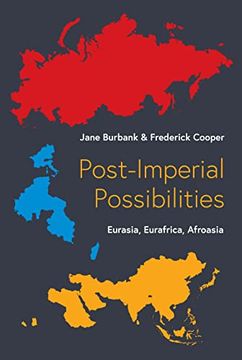Share
Post-Imperial Possibilities: Eurasia, Eurafrica, Afroasia
Jane Burbank Frederick Cooper (Author)
·
Princeton University Press
· Hardcover
Post-Imperial Possibilities: Eurasia, Eurafrica, Afroasia - Jane Burbank Frederick Cooper
Choose the list to add your product or create one New List
✓ Product added successfully to the Wishlist.
Go to My Wishlists
Origin: U.S.A.
(Import costs included in the price)
It will be shipped from our warehouse between
Monday, May 27 and
Wednesday, June 12.
You will receive it anywhere in United Kingdom between 1 and 3 business days after shipment.
Synopsis "Post-Imperial Possibilities: Eurasia, Eurafrica, Afroasia"
A history of three transnational political projects designed to overcome the inequities of imperialism After the dissolution of empires, was the nation-state the only way to unite people politically, culturally, and economically? In Post-Imperial Possibilities, historians Jane Burbank and Frederick Cooper examine three large-scale, transcontinental projects aimed at bringing together peoples of different regions to mitigate imperial legacies of inequality. Eurasia, Eurafrica, and Afroasia--in theory if not in practice--offered alternative routes out of empire. The theory of Eurasianism was developed after the collapse of imperial Russia by exiled intellectuals alienated by both Western imperialism and communism. Eurafrica began as a design for collaborative European exploitation of Africa but was transformed in the 1940s and 1950s into a project to include France's African territories in plans for European integration. The Afroasian movement wanted to replace the vertical relationship of colonizer and colonized with a horizontal relationship among former colonial territories that could challenge both the communist and capitalist worlds. Both Eurafrica and Afroasia floundered, victims of old and new vested interests. But Eurasia revived in the 1990s, when Russian intellectuals turned the theory's attack on Western hegemony into a recipe for the restoration of Russian imperial power. While both the system of purportedly sovereign states and the concentrated might of large economic and political institutions continue to frustrate projects to overcome inequities in welfare and power, Burbank and Cooper's study of political imagination explores wide-ranging concepts of social affiliation and obligation that emerged after empire and the reasons for their unlike destinies.
- 0% (0)
- 0% (0)
- 0% (0)
- 0% (0)
- 0% (0)
All books in our catalog are Original.
The book is written in English.
The binding of this edition is Hardcover.
✓ Producto agregado correctamente al carro, Ir a Pagar.

